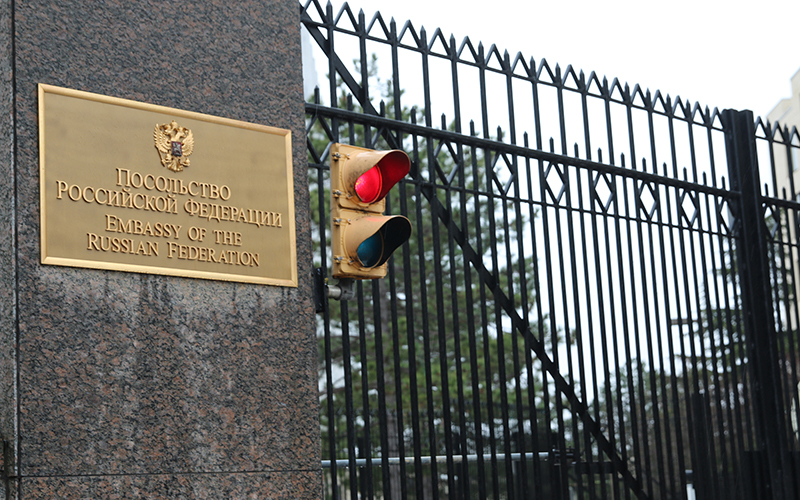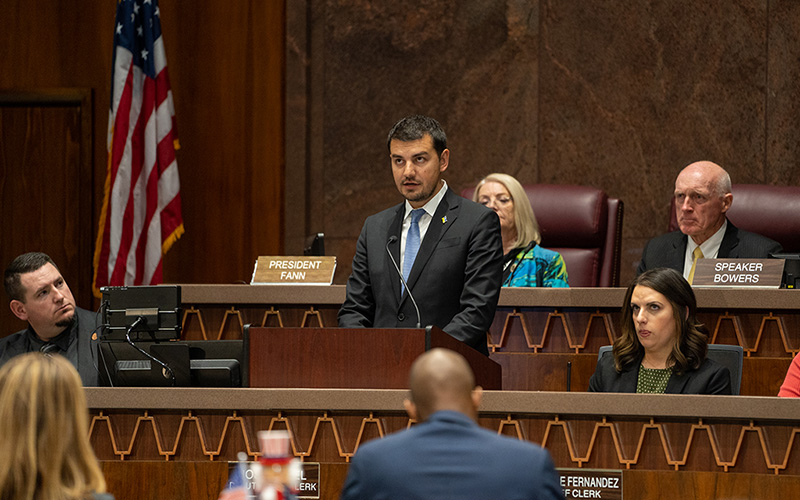
The Russian Embassy in Washington, D.C., on Feb. 24, the day Russia invaded Ukraine. Three months later, the war is dragging on and Russia has expanded its sanction on hundreds of Americans to include Arizona lawmakers – most of whom greeted the news with a smile or a shrug. (File photo by Emily Sacia/Cronkite News)
WASHINGTON – Rep. Ruben Gallego, D-Phoenix, took the news that he has been banned from entering Russia by its foreign ministry in stride – and with tongue firmly planted in cheek.
“I’m heartbroken. I was so looking forward to vacationing in Siberia,” Gallego tweeted in April in response to the list that was updated this weekend.
All nine members of Arizona’s House delegation were on the latest list, which includes hundreds of U.S. lawmakers, business and policy leaders, academics, activists, journalists and “other U.S. citizens under personal sanctions, including a ban on entry into the Russian Federation.”
The list first appeared in March, an expected response in kind to U.S. sanctions on Russia and Russian officials. But some of the names on the latest list were unexpected: Former Arizona Sen. John McCain, who was a harsh critic of Russian President Vladimir Putin, has been dead since 2018.
“Almost four years after his passing, Sen. John McCain’s name appearing on this farcical sanctions list shows just how much Sen. McCain still scares Vladimir Putin and his cronies in the Kremlin,” said Evelyn Farkas, executive director of the McCain Institute.
For other Arizonans who were on the list of 963 blacklisted Americans, reaction to that designation ranged from sarcasm to defiance, with many saying they would wear it as a badge of honor.
Rep. David Schweikert, R-Fountain Hills, said in an April Facebook post that making the list shows that “dictator Putin is afraid of someone who speaks out against atrocities committed by Russia. I am proud to continue to support our Ukrainian brothers and sisters in the face of aggression.”
Rep. Tom O’Halleran, D-Sedona, said he was “proud to be sanctioned by the Russian government this spring. I’m even more proud to hear I’ve now been banned. We must continue to fight back against Putin and his illegal and deadly war.”
While all of Arizona’s House members were on the most-recent list, which included more than 200 House members from both parties, the state’s two senators were not. Requests for comment from Arizona Democratic Sens. Kyrsten Sinema and Mark Kelly were not immediately returned.
The list did include 35 sitting senators and two more late senators, Orrin Hatch of Utah and Harry Reid of Nevada.
When it was first released in March, the stop list was a little more selective, targeting top U.S. officials including President Joe Biden, Vice President Kamala Harris and Secretary of State Anthony Blinken, among others.
The U.S. is not the only country whose citizens Russia blocked. Russia has also hit European Union member states, Japan and Canada with travel restrictions, after those countries imposed sanctions and expulsions on Russian officials to condemn its invasion of Ukraine in February.
But nobody is really sweating over not being able to gallivant through Red Square for their summer vacation.
“It won’t surprise any of you that none of us are planning tourist trips to Russia, and none of us have bank accounts that we won’t be able to access, so we’ll forge ahead,” said then-White House Press Secretary Jen Psaki in a March press briefing.
Rep. Raul Grijalva, D-Tucson, said this week that he is “looking forward to the day when I can visit Russia under a peaceful and democratically elected government much like that of Ukraine. My support of Ukraine remains steadfast in their fight against tyranny and fascism.”
Farkas, the McCain Institute director, also made the list that includes many think tank leaders. But she does not appear to be concerned.
“As for my name appearing on the list as well, while I enjoyed my previous visits to Russia, in the words of Sen. John McCain, I guess I’ll go to Sedona instead of Siberia now,” she said.

